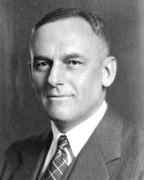Person: Jackson (3), Dunham

Dunham Jackson was an American mathematician who worked in approximation theory.
Mathematical Profile (Excerpt):
- William Jackson was a teacher of science and mathematics at the Normal School in Bridgewater, the school that both he and Mary Vose had attended.
- Dunham attended both elementary school and high school in Bridgewater.
- In 1904, when only sixteen years old, Jackson began his studies at Harvard University.
- Although mathematics was the main subject that Jackson studied at Harvard, he also took courses in astronomy, chemistry, physics, classical languages and modern languages.
- During these undergraduate years the lecturer who influenced him most was Maxime Bôcher; it was advice from Bôcher that led to Jackson's first paper Resolution into Involutory Substitutions of the Transformations of a Nonsingular Bilinear Form into Itself (1909) which he wrote while still an undergraduate.
- Jackson graduated from Harvard with an A.B (with distinction in mathematics) in 1908 and an A.M. in 1909.
- At Göttingen, Jackson learnt much from David Hilbert, Felix Klein and Ernst Zermelo, but the strongest influence on him was Edmund Landau who was his advisor.
- Jackson was awarded his doctorate by Göttingen in 1911 for his dissertation Über die Genauigkeit der Annäherung stetiger Funktionen durch ganze rationale Funktionen gegebenen Grades und trigonometrische Summen gegebener Ordnung Ⓣ(On the accuracy of the approximation of continuous functions by rational integral functions and trigonometric sums of a given degree and order).
- The fact that his results improved on those of very famous mathematicians gives sufficient assurance of the quality of his thesis, and Landau was amply justified when he labelled its topic "ein wunderschönes Thema." Jackson thus had the rare good fortune to produce, in his first major effort, results which were fundamental for the development of a major field.
- We should note that Jackson produced this remarkable thesis despite having health problems.
- Back in the United States, Jackson was appointed as an Instructor in Mathematics at Harvard in 1911 and, five years later, was promoted to Assistant Professor.
- The offer from Minnesota was a difficult one for Jackson for, on the one hand, it was a major promotion but, on the other hand, he was moving from Harvard with its big graduate school in mathematics to a place with no graduate school in the subject.
- Jackson published many important papers and rapidly gained an outstanding reputation as an excellent speaker.
- This theory covers a vast field, and, in his lectures, Professor Jackson chose certain topics in a few corners of this field in which he is personally interested and where he has made valuable contributions.
- As well as this monograph, Jackson published a student text Fourier Series and Orthogonal Polynomials in 1941 in the Carus Mathematical Monographs of the Mathematical Association of America.
- measures up fully to the expectation of the reader who is acquainted (and who is not?) with the lucid and elegant presentation - oral and written - of Dunham Jackson.
- In 1940 Jackson suffered a major heart attack.
Born 24 July 1888, Bridgewater, Massachusetts, USA. Died 6 November 1946, Minnesota, USA.
View full biography at MacTutor
Tags relevant for this person:
Origin Usa
Thank you to the contributors under CC BY-SA 4.0! 

- Github:
-

- non-Github:
- @J-J-O'Connor
- @E-F-Robertson
References
Adapted from other CC BY-SA 4.0 Sources:
- O’Connor, John J; Robertson, Edmund F: MacTutor History of Mathematics Archive
